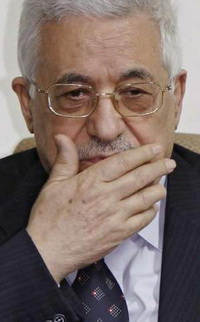Abbas's Resignation Is Bad News for Israel
Mahmoud Abbas's announcement that he won't seek another term of presidency of the Palestinian Authority is a culmination of almost six years of disappointment over the inability to establish a Palestinian state alongside Israel by agreement. It is also an acknowledgment that any further delay in achieving this goal will render it irrelevant. The alarm bells should be ringing loudly and incessantly in Israel. The fact that they are not is a manifestation of the superficial smugness that has come to replace policy in the upper echelons of the Netanyahu coalition.

The official Israeli response to the Palestinian leader's decision has been to shrug it off as an internal Palestinian matter. It is not. Such a move would substantially change the terms of the Palestinian-Israeli equation that have been in place since the beginning of the Oslo process. It is high time that Israeli decision-makers grasp what they have failed to in the past: that the Palestinians are players whose actions have a direct bearing on the country's strategic options. This requires making a serious effort to transcend the essentialist mind frame that has enabled this government to be lulled into inaction by its own words, to look rationally at the implications of a possible Abbas resignation at this time, and to take much-needed measures to avert such an eventuality, Jerusalem Post reports.
It was also reported, both Abbas's positive image as a state-builder, a Palestinian politician committed to developing the PA into a Palestinian state in a peaceful manner as part of the two-state solution for two peoples, and its negative, an image of a weak and inept politician - a wimp - were confirmed in the years of his prime ministership.
On the positive side, after the loss of Gaza to Hamas in June 2007, he boldly outlawed all armed groups - by implication this included the Fatah Tanzim and the Aksa Martyrs' Brigades - though one might ask why it took him so long to make the move. The reasoning behind the move was clear. Without a monopoly of violence, there could be no statehood. To this end, Abbas unabashedly continued and even intensified cooperation with the US to rebuild and reform the PA's security forces. To date, four battalions consisting of 2,000 security personnel have been trained under a program run by US Gen. Keith Dayton. These are the forces that enabled the PA from 2007 onward to take over civil security in the former trouble spots of Jenin and Nablus, Hebron and Bethlehem, Jerusalem Post reports.
Meanwhile, Hamas, founded a year before Arafat's declaration, rejects Fatah's vision of a two-state solution alongside Israel, does not recognize it and seeks to supplant Israel with an Islamist state, though some Hamas leaders have proposed an extended truce with Israel.
Israel withdrew its forces from the Gaza Strip in 2005 but remains in control of the territory's land and sea frontiers.
On Tuesday Fatah accused Hamas of detaining dozens of its members on Tuesday to stop them marking the 5th anniversary of the death of Yasser Arafat.
Hamas does not want to give Fatah any chance of regrouping in Gaza, and aims to retaliate for the suppression it says is regularly inflicted on its members by Fatah in the West Bank, Ha'aretz reports.
Subscribe to Pravda.Ru Telegram channel, Facebook, RSS!





